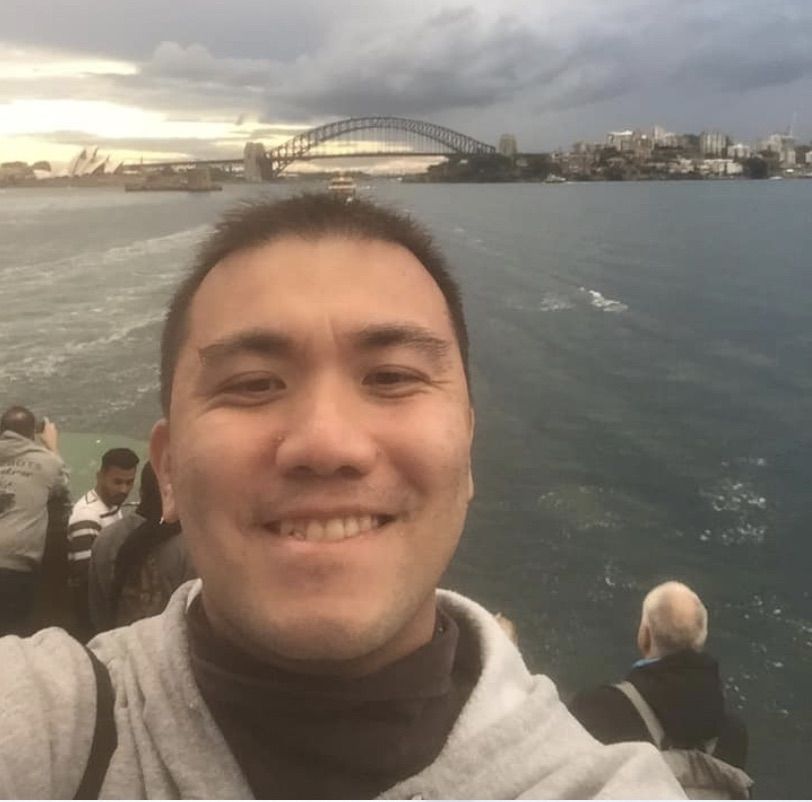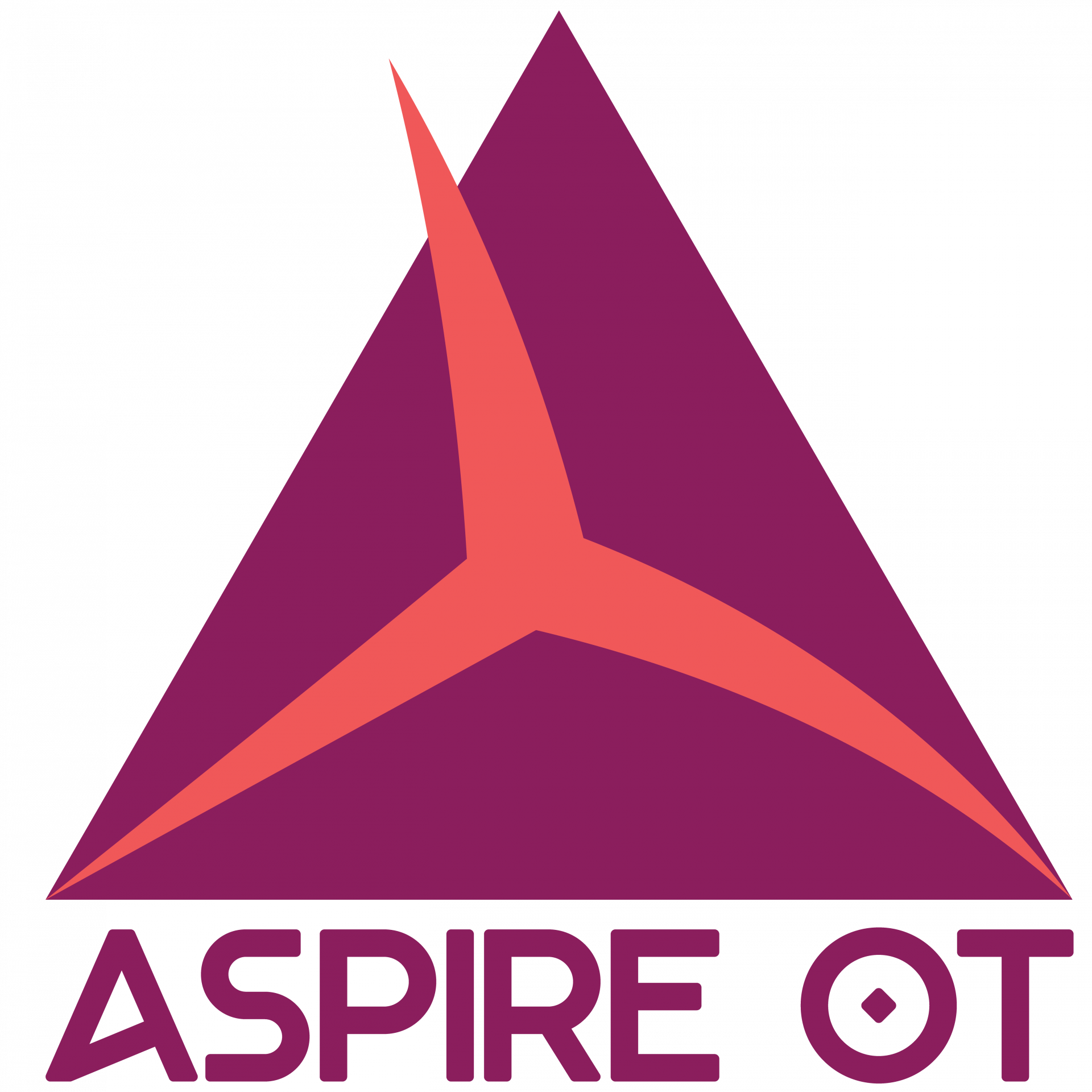
Welcome to guest blogger!
Bill Wong, OTD, OTR
Aspire OT is always excited to celebrate OTs, OTAs, and students who make an impact. Dr. Bill Wong is an occupational therapist, adjunct instructor and trailblazer. In this blog, Dr. Wong shares his experience as a mentee, TEDx talk speaker and TEDx organizer.
Behind each successful occupational therapy practitioner is a great mentor or mentoring team who made huge impacts on their careers. For my career, that OT mentor was Terry Olivas De La O, COTA, ROH.
I came to Terry as an OT student who was about to finish up my last level 2 fieldwork in 2012. Terry’s perception of me at the time was- a talented and passionate future leader in OT, but also extremely raw in experience and still learning how to conduct myself as a future professional and where I could make impact in OT. So, she told me, “Bill, it’s great that you know what you want long term. At this stage of your career, it’s OK that you don’t know how to get there yet. I have been around the block serving AOTA. I can get you there eventually. But, I am also aware that you have a growing social media presence. I think you can also be someone who can help showcase OT’s distinct values publicly in a way that few can. Will you be OK with me giving you some mentorship?” At that time, I was up for anything. Sure, part of it was that I was an almost new grad. But, part of it was that I remembered she got a shoutout in that year’s Eleanor Clarke Slagle lecture. So, I felt that it could be a great opportunity to learn from someone like that.
In early 2014, Terry passed away due to a variety of health issues. I was emotionally crushed. On top of that, I was in the middle of a failed practice attempt after my first OT job lasted 3 months. Simply put, my confidence to practice as an OT practitioner was not high. Being a leader or advocate in OT was out of reach. That said, because the OT profession was also crushed by Terry’s passing and many were aware that I was one of her mentees, there were a few who reached out to me to continue where Terry left off.
I did not pick Terry’s replacements rashly. I spent 3 months before approaching potential mentors to replace Terry. I ended up with 3 mentors because I felt that a team approach not only would reduce the burden of each member of the team individually, but also having the opportunity to listen to different opinions in situations when I need such can be valuable. Fortunately, the 3 mentors have been in agreement that I should continue to try to honor Terry in my own ways during my quests for my long-term goals.
So, the first million dollar question for this blog is- how have I been honoring Terry?
When Terry passed away, I told myself the first priority was to get back on my feet to make ends meet in OT first. Once I did that in summer 2014, I became aware that my dance partner at my state’s OT conferences, Carly Rogers, spoke at TEDxUCLA. That was significant because 2 months later, I was invited to be interviewed to speak at TEDxGrandForks (which I eventually got selected). When I got the news that I was selected, the first person I contacted was Carly, since she had some recent experiences on what I should expect. The key advice Carly told me was, “Enjoy the moment on stage. These 15 minutes can potentially change your life and career.”
Once I found out the date and times of the event and when she needed the ideas by, an 11 year old gave his potential TEDx talk pitch. During that time, I struggled to make a decision because the date of the event was the day I was supposed to be in Philadelphia to mentally get myself ready for AOTA conference. I then thought about it from an athlete’s perspective, “You can achieve many things over the course of your career. But, how many times can you make history? Yes, it might sound a little selfish. However, you will be an idiot for passing it up, particularly because this window of opportunity is super narrow!” So, I took up my courage to give my elevator speech after the 11 year old was done. Right after, I was told I was in the lineup before she and her mom left for home.
When I got my first TEDx event license just before AOTA conference in 2018, I did not know I signed up for a nightmare. I had no idea of critical items (e.g. video production crew, audio visual crew, stage production rentals, venue fees) of these events cost. I also was learning TED guidelines for organizers on the fly. On top of the fact that I have executive functioning difficulties, I limped to the finish line. What did I mean by that? I went through 3 planning teams in a 12 month period, lost at least $5000 financially, and broke a rule or two in the process. In addition, I was burned out multiple times during the experience. After the event, I told myself that I would not organize another TEDx event again after the final video of the first TEDx event was uploaded in December 2019.
As I got to observe another dozen events, I found my style. I also realized I have the necessary essential skills to put together TEDx events- editing speaker videos, designing intro reels, coaching speakers, and sequencing an entire event program. So, I am able to organize these events with speakers cheaply.
Of course, I understand many raise their eyebrows when I said that organizing TEDx events can be replicable. So, how? Before we go there, it is important to understand the necessary tasks of organizing TEDx events- 1) License application; 2) Team building; 3) Speaker recruitment; 4) Speaker Coaching; 5) Speaker screening; 6) Sponsors recruitment (if needed); 7) Game day planning; 8) Video editing; 9) Speaker video uploads completed.
So, what are some strategies the OT community should take to bridge this competency gap?
Keep things simple for your first event. Ensure the event has good flow and the sequencing makes sense are two awesome objectives to achieve, whether your event has invited speakers or not.
Adopt a “yes, I can” mentality. Yes, I know the first attempt is almost always difficult. But once you get through 1 experience, then you will know what adjustments you need to make for your future events. Set boundaries between doing this and what you are supposed to do in OT. For example, if I know I would be at an OT conference for a few days, I let my speakers and my team know that the conference times are off limits for working on the project. If your events have speakers, it will be helpful to know the expertise of your team. This is important because it will help in determining what topics your event are comfortable in coaching speakers and what not.
All in all, this seems like it is a lot of stuff. But considering that if signing up to organize TEDx events is a serious endeavor, it is important for you to understand what you will be in for. The intent of this article is not to intimidate anyone. Rather, it is to be used as a guide to make informed decisions on your strategies to replicate my efforts. After all, replicating my efforts is the only way to ensure there are more CONSISTENT supply of opportunities for deserving OT practitioners and students to speak on the TEDx platform. (I highlighted “consistent” here because I am the only TEDx organizer in the world who has an OT background. So, I know the value of OT and am trying my best to promote it as often as I logistically can while being legal with the rules in the process.) Sometimes we need to make efforts to proactively advocate for the profession to the public, rather than waiting for others to extend their hands to us!
Behind each successful occupational therapy practitioner is a great mentor or mentoring team who made huge impacts on their careers. For my career, that OT mentor was Terry Olivas De La O, COTA, ROH.
I came to Terry as an OT student who was about to finish up my last level 2 fieldwork in 2012. Terry’s perception of me at the time was- a talented and passionate future leader in OT, but also extremely raw in experience and still learning how to conduct myself as a future professional and where I could make impact in OT. So, she told me, “Bill, it’s great that you know what you want long term. At this stage of your career, it’s OK that you don’t know how to get there yet. I have been around the block serving AOTA. I can get you there eventually. But, I am also aware that you have a growing social media presence. I think you can also be someone who can help showcase OT’s distinct values publicly in a way that few can. Will you be OK with me giving you some mentorship?” At that time, I was up for anything. Sure, part of it was that I was an almost new grad. But, part of it was that I remembered she got a shoutout in that year’s Eleanor Clarke Slagle lecture. So, I felt that it could be a great opportunity to learn from someone like that.
In early 2014, Terry passed away due to a variety of health issues. I was emotionally crushed. On top of that, I was in the middle of a failed practice attempt after my first OT job lasted 3 months. Simply put, my confidence to practice as an OT practitioner was not high. Being a leader or advocate in OT was out of reach. That said, because the OT profession was also crushed by Terry’s passing and many were aware that I was one of her mentees, there were a few who reached out to me to continue where Terry left off.
I did not pick Terry’s replacements rashly. I spent 3 months before approaching potential mentors to replace Terry. I ended up with 3 mentors because I felt that a team approach not only would reduce the burden of each member of the team individually, but also having the opportunity to listen to different opinions in situations when I need such can be valuable. Fortunately, the 3 mentors have been in agreement that I should continue to try to honor Terry in my own ways during my quests for my long-term goals.
So, the first million dollar question for this blog is- how have I been honoring Terry?
During the 2 years we were together, Terry stressed the importance for me to have allies outside of the OT profession. She also encouraged me to toot my horns about OT whenever possible in a public setting. Meanwhile, I also volunteered at the final Amino Youth conference that was intended to empower Latina/Latino youth. Of course, I also felt her warmth and passion as a mentor. At that time, I did not know too much about TED, aside from remembering that I watched a couple TED talk videos during my OT school days.
When Terry passed away, I told myself the first priority was to get back on my feet to make ends meet in OT first. Once I did that in summer 2014, I became aware that my dance partner at my state’s OT conferences, Carly Rogers, spoke at TEDxUCLA. That was significant because 2 months later, I was invited to be interviewed to speak at TEDxGrandForks (which I eventually got selected). When I got the news that I was selected, the first person I contacted was Carly, since she had some recent experiences on what I should expect. The key advice Carly told me was, “Enjoy the moment on stage. These 15 minutes can potentially change your life and career.”
Fast forward to February 2015, I delivered my first TEDx talk. At that time, I thought, “Well! This is a once in a lifetime opportunity. I get to cross this item off my career bucket list.” That usually correct thought for most TEDx speakers after they spoke turned out to be dead wrong.
In December 2016, I attended TEDxLA. Because I foresaw I would have a difficult time finding parking, I got to the venue by public transit. Upon returning home, I met up with some other attendees. We had a debrief of the event. Then, in the middle of that conversation, one of the attendees said, “I am organizing a TEDx event soon. I am looking for speakers.”
Once I found out the date and times of the event and when she needed the ideas by, an 11 year old gave his potential TEDx talk pitch. During that time, I struggled to make a decision because the date of the event was the day I was supposed to be in Philadelphia to mentally get myself ready for AOTA conference. I then thought about it from an athlete’s perspective, “You can achieve many things over the course of your career. But, how many times can you make history? Yes, it might sound a little selfish. However, you will be an idiot for passing it up, particularly because this window of opportunity is super narrow!” So, I took up my courage to give my elevator speech after the 11 year old was done. Right after, I was told I was in the lineup before she and her mom left for home.
Fast forward to AOTA conference that year, I had OT practitioners asking me how they could speak at TEDx events. A few months later, I took the plunge to apply for my first TEDx events. At that time, I thought, “How hard could organizing a TEDx event be? I was a speaker before. I did some homework on how other local TEDx events in the Los Angeles area operate.”
When I got my first TEDx event license just before AOTA conference in 2018, I did not know I signed up for a nightmare. I had no idea of critical items (e.g. video production crew, audio visual crew, stage production rentals, venue fees) of these events cost. I also was learning TED guidelines for organizers on the fly. On top of the fact that I have executive functioning difficulties, I limped to the finish line. What did I mean by that? I went through 3 planning teams in a 12 month period, lost at least $5000 financially, and broke a rule or two in the process. In addition, I was burned out multiple times during the experience. After the event, I told myself that I would not organize another TEDx event again after the final video of the first TEDx event was uploaded in December 2019.
Ironically, it was COVID of all things that rekindled my passion. When COVID first declared as a pandemic in March 2020, the world was trying to adjust to new normals. During that time, some TEDx events across the globe shifted to virtual events in the matter of a few weeks. At that time, I was still skeptical because I wasn’t sure about the differences of how virtual vs. on ground TEDx events operate. As I was able to participate in a dozen virtual TEDx events from across the globe as an attendee, I noticed the quick evolutions of these events. So, I talked to other TEDx event licensees I have been connecting with since COVID. Their advice to me, “Bill, we can tell you are a passionate organizer. While you made your share of mistakes for your first event, all you really need to do is to organize smarter. Virtual can be cost effective if you have some talents and smarts.”
As I got to observe another dozen events, I found my style. I also realized I have the necessary essential skills to put together TEDx events- editing speaker videos, designing intro reels, coaching speakers, and sequencing an entire event program. So, I am able to organize these events with speakers cheaply.
Another million dollar question on this entry is- Why should the OT profession care about organizing these events? How can we even start?
Based on potential exposure, The TED talks and TEDx talks YouTube channels have similar levels of reach as the Tournament of Roses Parade. However, instead of costing $250,000 to $300,000 for a Tournament of Roses Parade float, it has now been proven that TEDx events can be significantly less to operate. On top of that, such efforts can also be potentially replicable.
Of course, I understand many raise their eyebrows when I said that organizing TEDx events can be replicable. So, how? Before we go there, it is important to understand the necessary tasks of organizing TEDx events- 1) License application; 2) Team building; 3) Speaker recruitment; 4) Speaker Coaching; 5) Speaker screening; 6) Sponsors recruitment (if needed); 7) Game day planning; 8) Video editing; 9) Speaker video uploads completed.
So, what are some strategies the OT community should take to bridge this competency gap?
Do some homework. Attend whatever TEDx events you can have access to. Treat the opportunities as if you are performing a content analysis in qualitative research.
Build a team you can trust. Your team should get your back. After all, deadlines can sneak up on teams time and time again, even experienced ones.
Keep things simple for your first event. Ensure the event has good flow and the sequencing makes sense are two awesome objectives to achieve, whether your event has invited speakers or not.
Network with local organizers in your area. If that’s not possible, use resources like TEDxHub and TEDxCommunity (on Facebook) to connect with other TEDx organizers.
Adopt a “yes, I can” mentality. Yes, I know the first attempt is almost always difficult. But once you get through 1 experience, then you will know what adjustments you need to make for your future events. Set boundaries between doing this and what you are supposed to do in OT. For example, if I know I would be at an OT conference for a few days, I let my speakers and my team know that the conference times are off limits for working on the project. If your events have speakers, it will be helpful to know the expertise of your team. This is important because it will help in determining what topics your event are comfortable in coaching speakers and what not.
All in all, this seems like it is a lot of stuff. But considering that if signing up to organize TEDx events is a serious endeavor, it is important for you to understand what you will be in for. The intent of this article is not to intimidate anyone. Rather, it is to be used as a guide to make informed decisions on your strategies to replicate my efforts. After all, replicating my efforts is the only way to ensure there are more CONSISTENT supply of opportunities for deserving OT practitioners and students to speak on the TEDx platform. (I highlighted “consistent” here because I am the only TEDx organizer in the world who has an OT background. So, I know the value of OT and am trying my best to promote it as often as I logistically can while being legal with the rules in the process.) Sometimes we need to make efforts to proactively advocate for the profession to the public, rather than waiting for others to extend their hands to us!
Occupational Therapy CEUs to Increase Your Confidence Promoting OT
Want more?
Our CEU courses will provide you with practical strategies you can take straight to your OT practice.
Aspire OT is a different kind of CEU company, owned by an OT & OTA.
Don't Miss A Thing!
Follow us on social media to stay up to date on all of our latest postings.
Join our newsletter
Get weekly updates on new blog posts, webinars, on-demand courses and more right in your mailbox.
Thank you!
Write your awesome label here.
Need a mentor?
Niccole and Kim would love to support you in your OT journey!
Just for OT Coaching is here to help you! Let Kim and Niccole share their experiences in clinical practice and professional leadership to help you achieve better outcomes.


